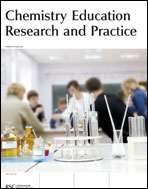The laboratory in science education: the state of the art
Abstract
For more than a century, laboratory experiences have been purported to promote central science education goals including the enhancement of students' understanding of concepts in science and its applications; scientific practical skills and problem solving abilities; scientific ‘habits of mind’; understanding of how science and scientists work; interest and motivation. Now at the beginning of the 21st century it looks as if the issue regarding learning in and from the science laboratory and the laboratory in the context of teaching and learning chemistry is still relevant regarding research issues as well as developmental and implementation issues. This special CERP issue is an attempt to provide up-to-date reports from several countries around the world. [Chem. Educ. Res. Pract., 2007, 8 (2), 105-107]
- This article is part of the themed collection: The Laboratory in Science Education: The State of the Art

 Please wait while we load your content...
Please wait while we load your content...